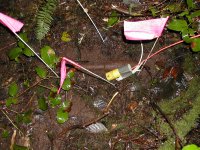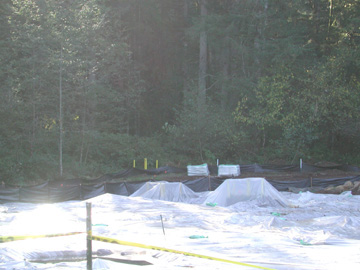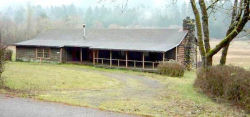On December 4, 2005, a petition was formally submitted to the Environmental Protection Agency (EPA), Region 10, Seattle, requesting that agency to designate the Troutdale and Unconsolidated Alluvium Aquifer System in Clark County, Washington, as a Sole Source Aquifer. The EPA defines the Sole Source Aquifer Program as a tool used to protect drinking water supplies in areas with few or no alternative sources to groundwater resources, and where if contamination occurred, using an alternative source for the potable water supply would be extremely expensive.
-
Collaboration to Achieve Groundwater Protection in Clark County – December 7, 2005
-
Rosemere Neighborhood Association and Clark County Natural Resources Council File Supplemental 60-Day Notice of Intent to Sue Under the Clean Water Act – April 8, 2005
The RNA and CCRNC filed a Clean Water Act lawsuit in October 2004 against
the City of Vancouver pertaining to the City’s unpermitted and contaminated stormwater discharge into Burnt Bridge Creek, and the Columbia River (both of which flow into Vancouver Lake). These discharges into threatened or endangered waterbodies are conveyed through the municipal stormwater sewer system.On April 1, 2005, RNA and CCNRC’s attorneys filed a supplemental notice of
intent to sue the City of Vancouver under the Clean Water Act for
unpermitted and contaminated non-stormwater related discharges. The city’s municipal stormwater system illegally conveys discharges into Burnt Bridge Creek and the Columbia River on a daily basis during dry weather. These discharges travel to and can impact the water quality of Vancouver Lake. [Read More...] -
Danger Lurks at Camp Bonneville – February 12, 2005

A 2.36" Rocket which was determined to be "Unexploded Ordnance" (Fired armed and did not function) It was found near demolition area 1 during monitoring well installation. (phote: epa)
Camp Bonneville (nearly 4000-acres) is an Army installation that was closed in 1995. It is located in Southeast Clark County about 12 miles east of Vancouver, WA. Established in 1909, the Camp has been used to train many generations of military personnel with field artillery. At one point, Royce Pollard, now Mayor of the City of Vancouver, was the commander of this facility. The Camp was decommissioned by the Army, and the property is slated for transfer to the Clark County Parks Department sometime within the next ten years. Plans have been mentioned for the County to build a public amphitheater and to open the area to hiking and other public uses. [Read More...]
-
Richard Smith letter to the Columbian – December 19, 2004
Unabridged letter printed:
This letter to the editor was written by the Rosemere Neighborhood Association’s attorney, Richard Smith. The letter was published in the Columbian on Sunday, December 19, 2004′ however, it was edited by the Columbian staff and pertinent commentary was removed. The letter is included here in its entirety as it was originally penned.
Dear Editor:
Scott Hewitt’s December 9, 2004 Reporter’s Notebook about the Rosemere neighborhood warrants a response. It is too bad that the Columbian chooses to slander the Rosemere Neighborhood Association, which is a group of well-intentioned people pointing out the naked-emperorness of city government for the common good. Also, how is it responsible journalism to repeat unsupported (and easily debunked) defamatory remarks in the context of an obvious neighborhood feud? [Read More...]
-
FISH IN VANCOUVER LAKE ARE CONTAMINATED AND UNSAFE FOR HUMAN CONSUMPTION – November 1, 2004
Anglers frequent fishing spots along the Columbia River and Vancouver Lake, and have done so for many years. However, Toxic Monitoring Data from the Washington State Department of Ecology indicates that fish in Vancouver Lake are not safe to eat. This is particularly dangerous for low-income folks who fish in this area out of necessity. [Read More...]
-
Work at Camp Bonneville to remove contamination – September 20, 2004

Landfill Four is coated in plastic to prevent erosion and movement of the pollution from rain. The yellow posts in the background mark a test well that is used to monitor ammonium perchlorate levels in the groundwater.
Camp Bonneville is a decommissioned military installation in Clark County. The US Army used this forested area for target practice, including the firing of missiles. The camp was also used as a munitions landfill. These buried munitions have caused a toxic underground plume of ammonium perchlorate to develop.
-
RNA tours Columbia with Riverkeeper – September 15, 2004

From Left to Right:
Patrica Giles, Greg deBruler, Karen Axell, Leslie Zega
Dvija Michael Bertish (front)
Aboard the Columbia Riverkeeper’s Boat near the I-5 Bridge
Photo taken by Cindy deBrulerOn a warm and sunny September day, RNA board members took a 2 ½ hour tour of the Columbia River from Camas all the way to the Port of Vancouver. Greg deBruler, Columbia Riverkeeper, and his wife, Cindy deBruler, Executive Director of Columbia Riverkeeper, brought their motor boat from White Salmon. [Read More...]
-
Media Correction: RE Columbian article “Rank water a worry” – July 19, 2004
On July 19, 2004, the Rosemere Neighborhood Association sent the following request for a correction to Erik Robinson, environmental reporter with the Columbian. This email was not aknowledged, nor did Mr. Robinson issue the correction. [Read More...]
-
SWIMMING MAY BE DANGEROUS IN LOCAL WATERS – July 14, 2004
According to an article in the San Francisco Chronicle, “Study finds pollution in coast rivers, hot spots have fecal bacteria that pose a danger to swimmers” (5 Jan 2001), this statement was reported in bold: “Fecal coliform, for instance, can cause hepatitis A, bacterial meningitis and encephalitis.” Fecal coliform is present in dangerous levels in many of the public swimming areas in our local lakes and rivers, meaning that these waterbodies are unsafe for human contact when fecal coliform levels are on the rise. [Read More...]
-
The City of Vancouver may owe certain residents money – June 16, 2004
Did you pay septic tank conversion fees? The City of Vancouver may owe you money!
From 1972 to at least 1999, many residents (citywide) paid fees into a septic tank conversion fund if their homes operated on private septic tanks instead of city sanitary sewer service. These funds were paid under monthly septic penalty fees. Some individuals may have equity in these fees in excess of $7,000 (including interest). [Read More...]












![Washington State Water Quality Assessment [303(d)] Washington State Department of Ecology](http://www.rosemerena.org/home/wp-content/uploads/2009/03/ecy_logo.gif)

